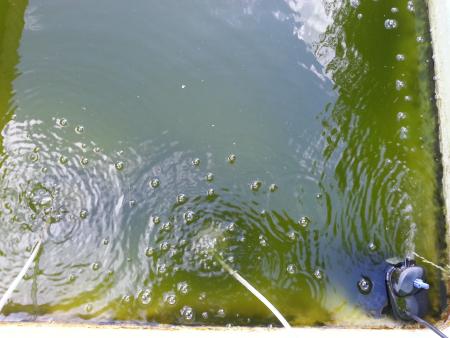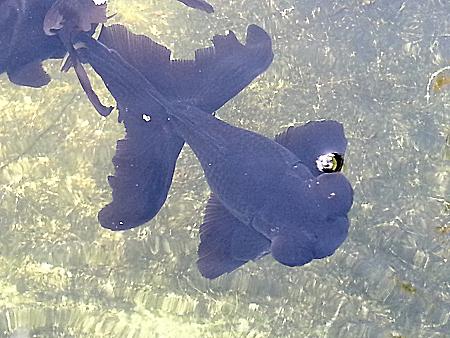| Back to Back Issues Page |
 |
|
The Goldfish Gazette, Issue #035 -- UV Clarifiers - do they work? November 29, 2016 |
Goldfish Care Tips and GuidelinesA Free Monthly Resource For Goldfish Enthusiasts In This Issue
UV clarifiers are used for the control of suspended algae in ponds (green water) but do they work? UV Clarifiers - Do They Work?
Unless a pond runs a filter, has very low fish numbers, is heavily planted and out of direct sunlight, at some time in the year, green water will become a problem. Algae need two things present to bloom, nutrients in the water and sunlight. When a filter processes waste it produces nitrates, the first algae requirement. The second, sunlight, can be at very low levels but algae still seem to get enough light to survive. My ponds have low fish numbers, heavy filtration and are in partial shade but still go green in spring. I must admit I feed heavily as I am either conditioning my fish for breeding or feeding for fast growth. My ponds are relatively small, 80 gallons, so I just do a water change, but with larger ponds, weekly total water changes are more of a problem. This is when UV clarifiers become extremely useful. Clarifiers, Sterilizers, What’s the Difference?UV clarifiers have two names, UV sterilizers and UV clarifiers.Essentially they are the same thing except clarifiers are only strong enough to clear water of suspended algae. Sterilizers are strong enough to clear water of algae, kill bacteria, free swimming parasites and even viruses. Clarifiers are commonly used in pond installations, sterilizers are generally installed in aquarium setups. How They WorkWater is pumped past a strong UV lamp and the light wave length disturbs the algae structure causing it to clump together making it easier for the filter to remove.The water flow is critical to the effectiveness of the clarifier/sterilizer. For a clarifier to work, the basic calculation is 40-50 US gallons (33-42 Imp gals) per hour (gph) per lamp watt. Sterilizers must have much lower water flows to be effective, hence the reason only high wattage sterilizers are able to be installed in ponds. To sterilize at the highest level to kill resistant viruses the water flow has to be as low as 5-10 US gph. As an example a UV clarifier with a 9 watt lamp can have a maximum water flow of 360 US GPH. This needs to be matched to the size of the pond it is installed in. For a clarifier to work, the water needs to be turned over at least every 2-3 hours so a 9 watt clarifier can be used on a 720-1080 gallon pond. Clarifier TypesStandalone – these clarifiers have their own water pump so can be installed as required.Inline – installed in the return line after the filter. The clarifier has to be matched to the filter output, the greater the flow, the higher the wattage lamp needed. Combination filter/UV clarifier – the clarifier UV lamp wattage should always match filter output but it would always pay to check. UV Clarifiers Don’t Replace Filters Clarifiers deal with algae that pass through filters, they don’t process fish waste or remove impurities, so water changes are still necessary. Clarifiers deal with algae that pass through filters, they don’t process fish waste or remove impurities, so water changes are still necessary.
Start with clean water otherwise the clumped algae will clog either the clarifier pre-filter or the filter. As with anything, price dictates quality. Some equipment sold as sterilizers will only clear alga because either the lamp wattage is too low or the water flow too high. Because of lamp quality or exaggerated claims from manufactures, as with filters, buy the biggest clarifier you can (within reason) to allow for a drop in efficiency. You can always slow the flow down which will actually make the clarifier more effective. Lamps should be replaced every year, or after 8000 hours of use as the effectiveness drops over time. To judge the effectiveness of clarifiers compare the before photo with the photo above 7 days later. When set up correctly, a clarifier will keep pond water crystal clear. To learn more about UV clarifiers click here... Comments? Ideas? Feedback? I'd love to hear from you. Just reply to this e-zine and tell me what you think, or what topics you want covered. Next Month's Topic Growing live foodwww.facebook.com/aboutgoldfish |
| Back to Back Issues Page |